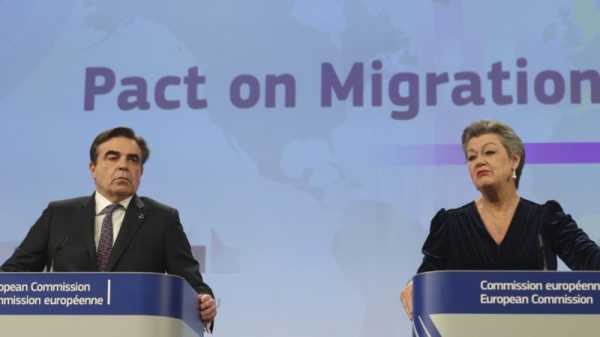
This week, the European Parliament’s civil liberties committee, LIBE, will vote on the EU’s New Pact on Migration and Asylum. Hope Barker and Sonja Grabowsky explain what is at stake.
Hope Barker is an independent researcher. Dr Sonja Grabowsky is a political advisor to MEP Dietmar Koester.
The Pact is a huge, complex, and politically significant package of legislation – and the manner in which it has been forced through in defiance of normal process poses dangers to democratic decision-making far beyond the scope of migration.
Political agreements on the Pact were made in a crunch summit at the end of last year that saw negotiators packed in a room for 48 hours. The aim of having reasoned technical discussions that create workable policy was sacrificed in an effort to force closure on the files within the timeline of the Spanish Presidency.
Sleep-deprived legislators tried to absorb masses of rapidly-changing information, whilst unable to consult experts.
The result was sweeping concessions to the Council position, diminishing the elected Parliament’s role. The eventual agreement has serious implications for the right to seek asylum in the EU, with people seeking safety held at external borders, subject to accelerated procedures, and swiftly returned to third countries.
More than 50 civil society organisations warned against these risks in an open letter that fell on deaf ears.
December’s political agreement, which was light on detail, was then further railroaded through. Final negotiations on the Pact were concluded in the absence of Shadow Rapporteurs, and those that did not hold rapporteurship on any of its files – such as the Greens and the Left – were left out altogether.
With Parliament’s mandate all but absent, some of the files are virtual copy-and-paste versions of the Council’s vague position.
Proper scrutiny may have dealt with the reality that the package was premised on the wrong legal basis from the start. In 2021, the Legal Service of the Council of the EU issued an opinion stating that the Pact was legally impossible due to its inclusion of Schengen elements alongside non-Schengen ones.
This was ignored until the last minute, when it became clear that the whole Pact could be thrown out by the courts.
This trend of acting first and asking questions later goes beyond the Pact. The recent Instrumentalisation Regulation on migration – which proposed significant infringements on rights in hazily-defined cases of foreign states exploiting migration – was rejected by Parliament after a damning Substitute Impact Assessment.
The assessment concluded that the Regulation was incompatible with international human rights and primary EU law, and would not meaningfully support frontline member states dealing with increased new arrivals. It slapped a false migration policy “fix” on a foreign policy issue.
Yet the spirit of the Instrumentalisation Regulation has become an accepted part of EU legislation regardless. It has appeared across the board, in the Crisis Regulation, the Schengen Borders Code Reform, the Facilitation Directive and the Visa Suspension Mechanism. Again, bypassing both Parliament and severe concerns over fundamental rights has become an EU legal norm.
The Commission says that impact assessments are a key part of its better regulation agenda, ensuring that laws “achieve their objectives in the most efficient and effective way”.
But this seems to not apply when they wish to push controversial ideas through; more and more files are introduced with no impact assessment. Parliament has to step in to commission its own versions, and is then ignored regardless.
In another case, civil society organisations submitted a complaint to the EU Ombudsperson regarding the surveillance activities under the EU Emergency Trust Fund for Africa.
The EU Ombudsman duly found that no impact assessment had been conducted, and called on the Commission’s European External Action Service to ensure human rights risk assessments were taking place.
More recently, the Commission’s ‘renewed EU action plan against migrant smuggling’ put forward two files – the Facilitation Directive and the Europol Regulation – with no impact assessment, citing undefined “urgent operational needs”.
The files could have devastating impacts for people on the move, and those acting in solidarity with them, by augmenting a framework in which migration is treated as a criminal phenomenon.
Legislators are guardians of the EU’s Treaties and the founding principles of human freedom, dignity, democracy, equality, rule of law and human rights. In migration and asylum, we see an ever-widening distance from those principles.
Rights violations against people on the move have become the norm at Europe’s borders in the form of violent pushbacks, the en masse detention of children, families, vulnerable individuals at borders, and the ever-rising death toll at sea.
Instead of addressing these issues, policies like the New Pact are entrenching systems that have been proven not to work. To shrug off scrutiny and accountability, the rules of the ordinary legislative procedure and the recommendations for better law-making are swept aside.
This should worry us all; it is easy to get into the habit of such arbitrary and short-termist decision-making, and hard to get out of it.
MEPs, regardless of their political views on migration legislation, should be particularly concerned. Parliament is the EU’s only elected body, there to represent European citizens.
They cannot do so if their mandate is ignored. MEPs must stand with civil society and citizens to defend the rights the EU guarantees for all people within it – including those who are undocumented or on the move.
Source: euractiv.com



